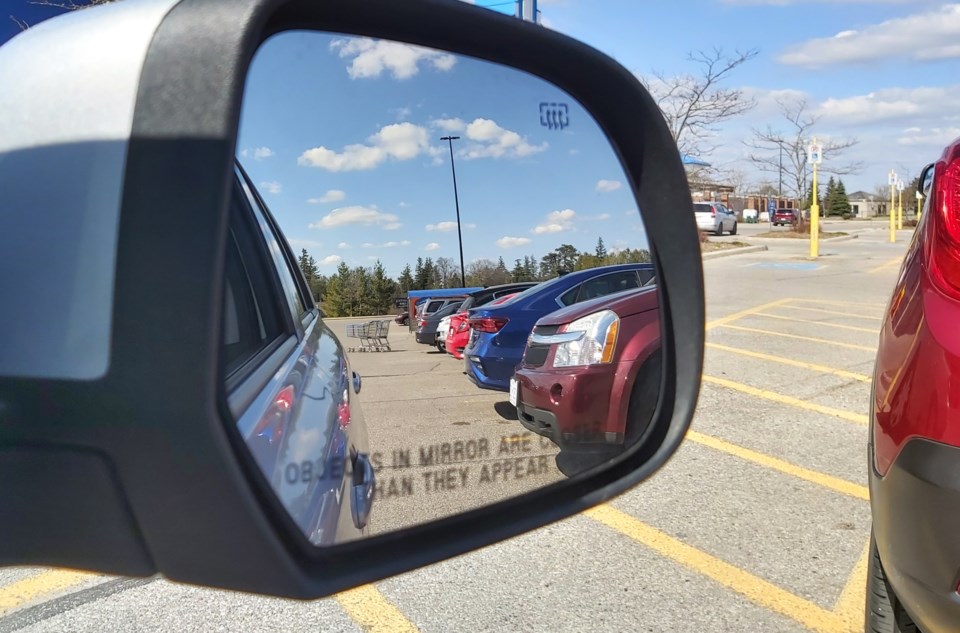A series of proposed off-street parking rule changes received a rough ride from city council on Wednesday evening, as members gathered for a virtual workshop aimed at gathering their input and insights.
Council raised numerous potential issues regarding changes to the quantity of parking spaces required for new apartment buildings and commercial areas, as well as limits to residential driveway widths.
Key among those concerns were the “inequity” between neighbourhoods in terms of parking space limitations and resident needs, and questions about whether the city has a sufficient transit system in place to accommodate people if steps are taken to discourage personal vehicle use.
On these matters, council was clearly divided.
“I don’t believe they meet the needs of our city whatsoever,” commented Coun. Mark MacKinnon in relation to potential reductions to maximum allowable driveway widths. “We don’t want people parking on the street.”
“I could not disagree more,” responded Coun. Leanne Caron, who called for the idea of encouraging street parking or neighbourhood parking lots to be considered. To increase driveway widths would be “going completely backwards to what people value about our city.”
Comments and questions from council are to be used by consultants and city staff in preparing an updated draft comprehensive zoning bylaw, of which off-street parking is only a part, set to be publicly released this fall, followed by engagement efforts.
Comprehensive zoning bylaws deal with a range of requirements for development in both established areas and new subdivisions.
The city’s current comprehensive zoning bylaw has been in place since 1995. Efforts to craft an updated version began in 2019 with a series of regulation reviews and surveys, as well as gathering information about what other municipalities are doing and social trends.
Parking requirements have long been a heated issue in the city, especially in light of residential intensification demands, student housing, limits faced by older areas, street widths, affordability, and the stated goal of reducing vehicular traffic.
Proposed changes brought forward for discussion on Wednesday include allowing fewer parking spaces for new apartment buildings – a decrease of 0.4 spaces per unit in mixed-use areas, and 0.25 fewer spaces for the first 20 units and 0.1 fewer spots for additional units – with the requirement for retail parking cut in half or less.
Most controversial of the potential changes is a recommendation that residential driveway widths be capped at half that of the dwelling or limits already in place (varies by zoning), whichever is less.
While some councillors called for flexibility to meet the parking needs of residents on their own property, others questioned the logic of paving space that could be used for tree-planting, natural storm water drainage and landscaping.
"Addressing our parking issues with more pavement in residential areas is not an option," said Coun. James Gordon.
"Are we asking the public space, the road, to account for a lack of parking on a development lot?" questioned Coun. Dan Gibson. "That's my concern."
Some other things that should be considered include:
- The effectiveness of transit (Coun. Dominique O’Rourke)
- Impacts related to quantifiable growth in popularity of ride sharing and reduced vehicle ownership (O’Rourke)
- The proportion of people who both live and work in the city versus commuters (O’Rourke)
- Use of permeable materials to allow driveway width expansions (Gordon)
- The spike in home prices and its impact on the ability of affordability (Gibson)
- The impact of parking space limits on large or multi-generation households (Coun. Rodrigo Goller)
- The pending arrival of all-day, two-way GO transit (Mayor Cam Guthrie)
- Potential to “exacerbate” problems with overflow parking on streets (O’Rourke)
- Ensuring residents have room for things such as waste bins and electric vehicle charging stations, as well as to meet accessibility needs (O’Rourke)
- Intensification of rentals within units if additional parking is allowed (Caron)
- Impacts associated with recent provincial rules allowing for secondary and tertiary units on properties (Coun. Cathy Downer)
Several council members also questioned the assertion that reducing the required parking for new developments will result in savings passed on to the purchaser or renter.
“I don’t believe reduced parking will often result in affordable housing,” noted Downer – a comment echoed by numerous others. “We need guarantees to reduce parking.”
Guthrie is also seeking to learn how effective the “many millions” of public and private dollars spent on encouraging less dependence on personal vehicles has been, noting he’s seen bicycle racks employers were required to provide rusting away without use.
“We have heard lots tonight,” commented Abby Watts, project manager for the city.
